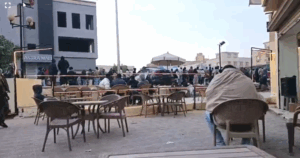High Committee: ‘West Darfur crisis not tribal’
The High Committee for Managing the West Darfur Crisis, which began on December 28, 2019 around El Geneina, and claimed dozens of lives last month, asserts that “the events were not tribal, as has been reported by the media”. International humanitarian efforts are underway to assist more than 40,000 people displaced by the violence.
 Displaced children play among salvaged belongings after the violence in El Geneina (RD)
Displaced children play among salvaged belongings after the violence in El Geneina (RD)
The High Committee for Managing the West Darfur Crisis, which began on December 28, 2019 around El Geneina, and claimed dozens of lives last month, asserts that “the events were not tribal, as has been reported by the media”. International humanitarian efforts are underway to assist more than 40,000 people displaced by the violence.
On Wednesday, the committee said in a press conference held at the Teiba Press Hall in Khartoum that based on evidence and facts, such as audio recordings, written evidence, and a statement by the University of El Geneina, in addition to the circumstantial facts in the place of the events, such as killing, fire, rape, and theft, confirm that the events are not tribal.
The committee holds the responsibility for the incidents to “the state’s governor, the security committee, and other defendants”.
Member of the committee, lawyer Abdo reported that the Rapid Support Forces (RSF) government militia in El Geneina is holding members of the regular forces and civilians.
He said that these detainees have not been charged. He described the step as a crime, noting that the RSF do not have the jurisdiction to detain any person, and demanded that the authorities release the detainees immediately.
The High Committee for the Management of West Darfur Crisis stated that 180 cases of assault with gunfire, nine cases of murder, three cases of rape, and 18 armed robberies in West Darfur preceded the recent events.
The committee noted in the conference that throughout these events, individuals or groups did not move to attack an ethnic group, village or settlement in a sign that affirming that the events were not tribal.
The committee appealed to international organisations and others to contribute to resolving the crisis, noting that the affected people are now in urgent need for tents, shelter, water, food, and health services.
UNHCR
The UN Refugee Agency (UNHCR) says that it and its partners are supporting 18,000 people displaced by violence in Darfur with urgently needed blankets and relief items.
In a flash update issued yesterday, the agency says that an inter-agency response through the Non-Food Item Pipeline, managed by UNHCR, is rushing relief items to some 40,000 displaced men, women and children in West Darfur. In addition, a UNHCR mission in Chad found some 5,500 Sudanese men, women and children who had fled across the border to seek shelter in 12 villages.
In the first days of the distribution, UNHCR distributed non-food item (NFI) kits to over 8,000 vulnerable people. Together with the UN Migration Agency IOM and SRCS (Sudanese Red Crescent Society), an additional 3,000 men, women and children received critical NFIs, including blankets, sleeping mats and jerry cans. Additional distributions should bring the total number of recipients to 18,000 by 8 January. More NFIs are in the pipeline, the statement says.

A majority of the displaced, currently scattered at 25 gathering points, found shelter in schools, mosques and government buildings that are not equipped for this purpose and lack sanitation facilities and water. UNHCR provided plastic sheets to support the construction of 50 emergency latrines.
In addition to the internal displacement in West Darfur, some 5,500 individuals fled to 12 nearby villages in Chad, as assessed by a joint mission of UNHCR and Chadian authorities. They are staying in the open or under makeshift shelters, offering little to no protection from the elements.
Radio Dabanga’s editorial independence means that we can continue to provide factual updates about political developments to Sudanese and international actors, educate people about how to avoid outbreaks of infectious diseases, and provide a window to the world for those in all corners of Sudan. Support Radio Dabanga for as little as €2.50, the equivalent of a cup of coffee.












 and then
and then